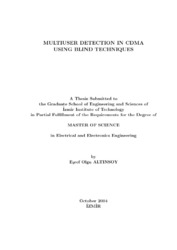Please use this identifier to cite or link to this item:
https://hdl.handle.net/11147/3357Full metadata record
| DC Field | Value | Language |
|---|---|---|
| dc.contributor.advisor | Altınkaya, Mustafa Aziz | en |
| dc.contributor.author | Altınsoy, Eşref Olgu | - |
| dc.date.accessioned | 2014-07-22T13:51:22Z | - |
| dc.date.available | 2014-07-22T13:51:22Z | - |
| dc.date.issued | 2004 | en |
| dc.identifier.uri | http://hdl.handle.net/11147/3357 | - |
| dc.description | Thesis (Master)--Izmir Institute of Technology, Electronics and Communication Engineering, Izmir, 2004 | en |
| dc.description | Includes bibliographical references (leaves: 63-65) | en |
| dc.description | Text in English; Abstract: Turkish and English | en |
| dc.description | xiv, 69 leaves | en |
| dc.description.abstract | In code division multiple access (CDMA) systems, blind multiuser detection (MUD) techniques are of great importance, especially for downlinks, since in practice, it may be unrealistic for a mobile user to know the spreading codes of other active users in the channel. Furthermore, blind methods remove the need for training sequences which leads to a gain in the channel bandwidth. Subspace concept in blind MUD is an alternative process to classical and batch blind MUD techniques based on principle component analysis, or independent component analysis (ICA) and ICA-like algorithms, such as joint approximate diagonalization of eigen-matrices (JADE), blind source separation algorithm with reference system, etc. Briefly, the desired signal is searched in the signal subspace instead of the whole space, in this type of detectors. A variation of the subspace-based MUD is reduced-rank MUD in which a smaller subspace of the signal subspace is tracked where the desired signal is contained in. This latter method leads to a performance gain compared to a standard subspace method. In this thesis, blind signal subspace and reduced-rank MUD techniques are investigated, and applied to minimum mean square error (MMSE) detectors with two different iterative subspace tracking algorithms. The performances of these detectors are compared in different scenarios for additive white Gaussian noise and for multipath fading channels as well. With simulation results the superiority of the reduced-rank detector to the signal subspace detector is shown. Additionally, as a new remark for both detectors, it is shown that, using minimum description length criterion in subspace tracking algorithm results in an increase in rank-tracking ability and correspondingly in the final performance. Finally, the performances of these two detectors are compared with MMSE, adaptive MMSE and JADE detectors. | en |
| dc.language.iso | en | en_US |
| dc.publisher | Izmir Institute of Technology | en |
| dc.rights | info:eu-repo/semantics/openAccess | en_US |
| dc.subject.lcc | TK5103.452 .A46 2004 | en |
| dc.subject.lcsh | Code division multiple access | en |
| dc.title | Multiuser detection in CDMA using blind techniques | en_US |
| dc.type | Master Thesis | en_US |
| dc.institutionauthor | Altınsoy, Eşref Olgu | - |
| dc.department | Thesis (Master)--İzmir Institute of Technology, Electrical and Electronics Engineering | en_US |
| dc.relation.publicationcategory | Tez | en_US |
| item.openairecristype | http://purl.org/coar/resource_type/c_18cf | - |
| item.cerifentitytype | Publications | - |
| item.fulltext | With Fulltext | - |
| item.languageiso639-1 | en | - |
| item.grantfulltext | open | - |
| item.openairetype | Master Thesis | - |
| Appears in Collections: | Master Degree / Yüksek Lisans Tezleri | |
Files in This Item:
| File | Description | Size | Format | |
|---|---|---|---|---|
| T000459.pdf | MasterThesis | 864.37 kB | Adobe PDF |  View/Open |
CORE Recommender
Page view(s)
98
checked on Apr 15, 2024
Download(s)
36
checked on Apr 15, 2024
Google ScholarTM
Check
Items in GCRIS Repository are protected by copyright, with all rights reserved, unless otherwise indicated.